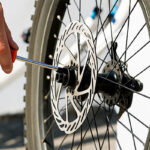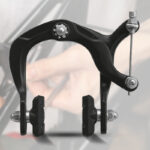Brake cables are an essential component of any bicycle, ensuring safe and effective speed control. They play a crucial role in the braking system by transmitting force from the brake levers to the brake calipers, which subsequently engage the brake pads against the wheel rims. Neglecting this aspect of bicycle upkeep can reduce braking efficiency and pose serious risks while riding. Regular checks and timely replacements can prevent issues such as cable fraying or rust and weather resistance, ensuring that your brakes respond promptly when needed. In this article, we will discuss some key maintenance tips to keep your brake cables in top condition, helping you enjoy a safer and more efficient cycling experience.
- Regular Inspection
Regular inspection of your brake cables is the first step in ensuring optimal performance. Check for any signs of wear, fraying, or corrosion. Look for any kinks or bends in the cables, as these can affect their functionality. It’s important to address any issues as soon as they are identified to prevent further damage and ensure safe performance.
- Lubrication
Lubricating your brake cables is essential for smooth and effective operation. Use a small amount of bike-specific lubricant to the cables ensuring that the lubricant penetrates the inner cable and housing. This will help to reduce friction and ensure that your brakes respond quickly and consistently.
- Cable Tension
Proper cable tension is pivotal for optimal brake performance. If the cables are too loose, the brakes may feel spongy and unresponsive; if too tight, the brakes may drag or lock up. Adjust the tension of your brake cables according to riding conditions according to the recommended guidelines to ensure that they operate smoothly and effectively.
- Cable Housing
Inspect the brake cable housing for any signs of damage or wear. Cracks, dents, or compression in the housing can affect brake performance. Replace any damaged housing to ensure that your brake cables function properly.
- Cleanliness
Keeping your brake cables clean is important for their longevity and performance. regularly wipe the cables clean to remove any dirt, grime, or debris that may have accumulated. This will help prevent premature wear and ensure that your brakes operate smoothly.
- Professional Inspection
If you are unsure about the condition of your brake cables or how to perform maintenance tasks, it’s best to seek professional assistance. A qualified bike mechanic can inspect your brake cables and perform any necessary maintenance or repairs such as brake tuning or cable replacement to ensure their optimal performance.
Conclusion
Maintaining brake cables is essential for ensuring optimal performance and safety while riding. By inspecting regularly for wear and tear, cleaning and lubricating, and replacing components, when necessary, you can prolong the life of your brake cables and prevent potential accidents. Remember to always follow the manufacturer’s guidelines for maintenance and seek professional help if you are unsure about any aspect of brake cable maintenance. Taking the time to care for your brake cables will not only enhance your cycling experience but also contribute to a safer cycling environment for all cyclists.
Read More About “Understanding Brake Levers: A Key Component of Your Bicycle“





